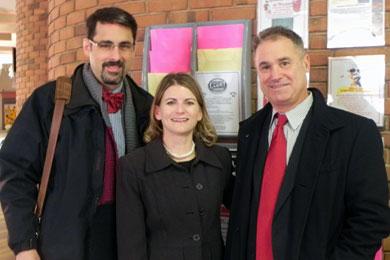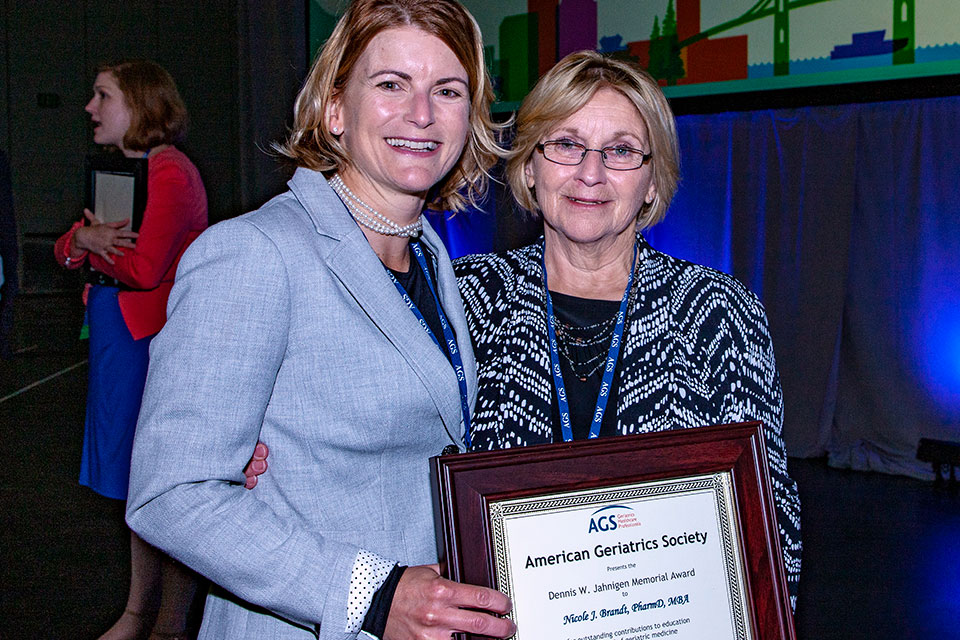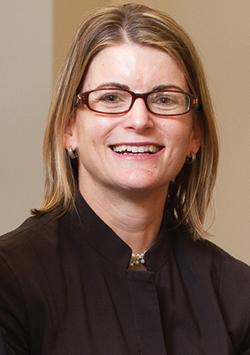SOP Seminar Educates Patients and Caregivers About MTM Services
Presentations emphasize team-based approach to health care and provide participants with tools to better understand and manage their medications.

By Malissa Carroll
December 18, 2013
“It takes a team.”
This was the message echoed during the Waxter Wisdom Seminar on Medication Therapy Management (MTM) on Dec. 11, when Nicole Brandt, PharmD, CGP, BCPP, FASCP, associate professor in the Department of Pharmacy Practice and Science (PPS) and director of clinical and educational programs at the Peter Lamy Center on Drug Therapy and Aging at the University of Maryland School of Pharmacy, joined other health care professionals from the University of Maryland and beyond at the Waxter Senior Center in Baltimore to offer helpful tools and advice aimed at assisting older adults and their caregivers to properly manage their medications.
“As a practicing pharmacist, I have come across some of the same medication-related challenges that you as patients and your caregivers often encounter,” assured Brandt. “Managing multiple medications, medication misadventures, and other safety concerns remains a growing problem for older adults. It truly takes a team to help increase public awareness about these potentially problematic medication concerns.”
More than 10 percent of hospital admissions among older adults are associated with adverse drug events. Forty-eight percent of those hospital admissions occur among adults 80 years or older, with 66 percent resulting from unintentional overdoses. To help educate patients and caregivers about the importance of proper medication management, Brandt shared a number of tools and resources designed to help older adults and their caregivers identify medications that can potentially put them at high risk for a number of health problems.
“If medication-related problems were ranked as a disease, they would be the fifth leading cause of death in the United States,” said Brandt. “One of the things that I teach students in all health professions is that any new symptom should be considered a drug side effect until proven otherwise. If you start falling, getting confused, or feeling more lethargic, look at your medications – not only your prescription medications, but all of your medications, including any over-the-counter drugs that you might be taking.”
Brandt also discussed her work serving on a panel of experts in nursing, geriatric medicine, and pharmacotherapy to revise the Beers Criteria for Potentially Inappropriate Medication Use in Older Adults. She shared the updated list of medications with participants and offered tips that participants could use to talk with their health care providers about any concerns they had about the medications they were prescribed.
Joining Brandt as presenters at the Waxter Wisdom Seminar on Medication Therapy Management were her colleagues Jacob Blumenthal, MD, FACP, assistant professor in the Department of Medicine at the University of Maryland School of Medicine; Michelle Ketcham, PharmD, MBA, acting director of the Division of Clinical and Operational Performance at the Centers for Medicare and Medicaid (CMS); Gary Wirth, RPh, MBA, pharmacist and contracting officer representative in the Medicare Drug Benefit and C&D Data Group at CMS; and Rebecca Bradley, MSW, program manager for the State Health Insurance Assistance Program (SHIP) at the Baltimore City Health Department.
Blumenthal continued Brandt’s message of team-based health care in his presentation about medication management in individuals with dementia, highlighting a case study from his clinic at the Baltimore VA Medical Center.
“Medication management is always a challenge, and it is an even greater challenge in older individuals,” said Blumenthal. “Those challenges, particularly in individuals with dementia, are always complex. To address them, you need not only a range of abilities and skills on your health care team, but also ongoing attention. Coordination and cohesion are crucial; this is a team-based approach.”
Ketcham and Wirth provided an overview of the MTM services currently covered under Medicare and discussed the benefits that those services offer patients, while Bradley spoke about the government assistance programs, including Extra Help and the Senior Prescription Drug Assistance Program, available to help older adults afford prescription drug coverage.
At the seminar’s conclusion, presenters, patients, and caregivers alike expressed agreement on the benefits of a team-based approach to health care, but questions remained about who was most qualified to lead the team.
One audience member, however, believed she knew the answer.
“What I am taking away from this is that it’s good to have a health care team that you can trust and get to know, but you better make the pharmacist your best friend,” she remarked. “It’s the pharmacist who understands the dynamics of all your medications and how they are most likely to impact your health.”



